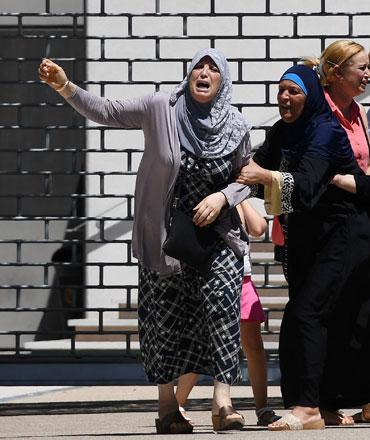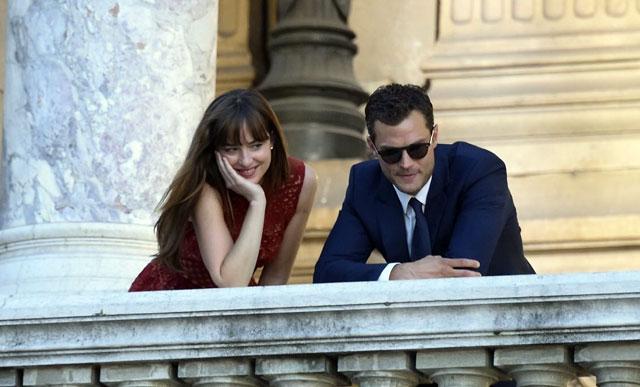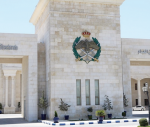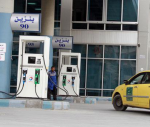You are here
French train attacker ‘went to Syria’
By AFP - Aug 22,2015 - Last updated at Aug 22,2015
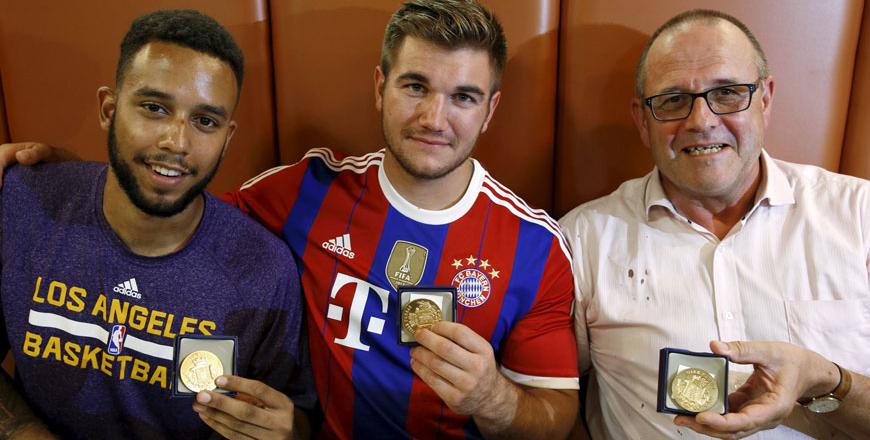
Left to right: Anthony Sadler from Pittsburg, California, Aleck Sharlatos from Roseburg, Oregon, and Chris Norman, a British man living in France, three men who helped to disarm an attacker on a train from Amsterdam to France, pose with medals they received for their bravery at a restaurant in Arras, France, on Friday (Reuters photo)
ARRAS, France — A gunman overpowered by three young Americans on a packed Amsterdam-Paris commuter train had visited Syria and was known to both French and Spanish intelligence services, officials said Saturday.
The suspect, who was wrestled to the floor after opening fire with an assault rifle on a high-speed train on Friday evening, is believed to be a 26-year-old of Moroccan origin and is now being interrogated by counter-terrorist officials near Paris.
He is understood to have lived in both Spain and France, and a Spanish counter-terrorism source told AFP he travelled to war-torn Syria last year. "Once in France he went to Syria, then returned to France," the source said.
French Interior Minister Bernard Cazeneuve said Spanish intelligence services had flagged the man to the French authorities "due to his membership of the radical Islamist movement".
Armed with a Kalashnikov assault rifle, an automatic pistol, nine cartridge clips and a box-cutter, the attacker opened fire on board the TGV train just after it crossed from Belgium into France on Friday evening.
But the attack was quickly stopped when three Americans — including two off-duty soldiers — charged the gunman and overpowered him.
"I looked back and saw a guy enter with a Kalashnikov. My friends and I got down and then I said 'Let's get him'," Alek Skarlatos, a 22-year-old member of the National Guard in Oregon, told France's BFMTV.
Spencer Stone, who is reportedly in the US Air Force, was the first to reach the gunman who slashed him in the neck and hand with a box-cutter.
"At that point I showed up and grabbed the gun from him and basically started beating him in the head until he fell unconscious," said Skarlatos, who recently returned from service in Afghanistan.
Their friend, US student Anthony Sadler, told French TV the attacker "didn't stand a chance".
"He didn't say anything. He was just telling us to give back his gun. Give me back my gun! Give me back my gun!" said Sadler.
A 62-year-old British consultant, Chris Norman, was also praised for helping subdue the gunman, as was a Frenchman who had earlier tried to stop him as he came out of the toilet carrying a gun.
"The bravery of Mr Norman and the other passengers helped to prevent a terrible incident," said British Prime Minister David Cameron in a statement.
The train heroes are to be received by President Francois Hollande at the Elysee Palace "in the coming days", his office said in a statement.
Stone was taken to hospital along with another unnamed American passenger, who was hit in the shoulder with a bullet. Neither are in critical condition, Cazeneuve said.
"Even after being injured [Stone] went to go help the other man who was bleeding," said Sadler. "Without his help, he would have died."
‘Kind of crazy'
Mobile phone footage from inside the train and played on several TV stations shows the suspect, a skinny man wearing white trousers and no shirt, flattened on the floor of the train with his hands and feet tied behind his back.
He was arrested when the train with 554 passengers aboard stopped at Arras station in northern France.
"I'm just a college student," said Sadler. "I came to see my friends for my first trip to Europe and we stop a terrorist. It's kind of crazy."
President Barack Obama praised the passengers, saying "it is clear that their heroic actions may have prevented a far worse tragedy".
Analysts said it was not surprising someone could launch an attack even though he was on a watch-list.
"It's the perennial problem of how you prioritise between serious concerns," said Raffaello Pantucci, counter-terrorism expert at Royal United Services Institute in London.
"It's a very resource-intensive job to watch someone 24 hours a day. Intelligence agencies just aren't big enough to do that for everyone," he said.
France has been on high alert since Islamist gunmen went on the rampage in January, killing 17 people in Paris.
In June, a man beheaded his boss and tried to blow up a gas plant in southern France in what prosecutors say was an attack inspired by the Daesh group.
Around 850 French and 300 Belgians have left to fight in Syria and Iraq, and hundreds have already returned, say intelligence officials, overwhelming their ability to monitor them all.
Related Articles
PARIS — A heavily armed gunman previously flagged by intelligence services who was overpowered by passengers in a crowded train said he was
NICE, France — The Daesh terror group claimed responsibility Saturday for the truck massacre in Nice, as France highlighted the "extreme dif
LOS ANGELES — Universal’s opening of “Fifty Shades Freed” is dominating North American moviegoing this weekend with a solid $38.8 million at



